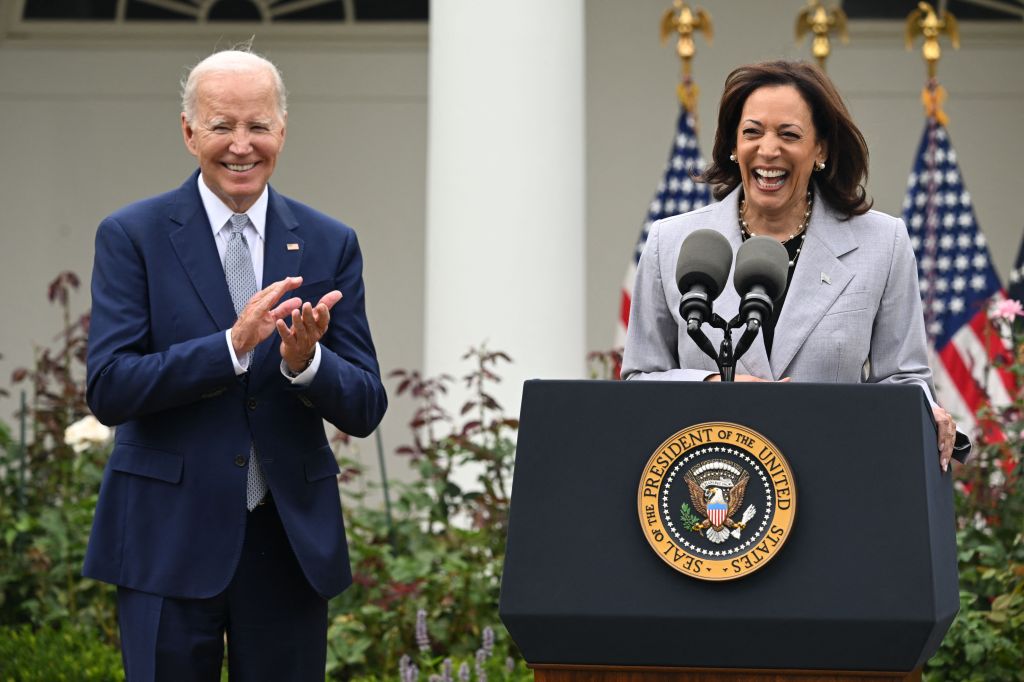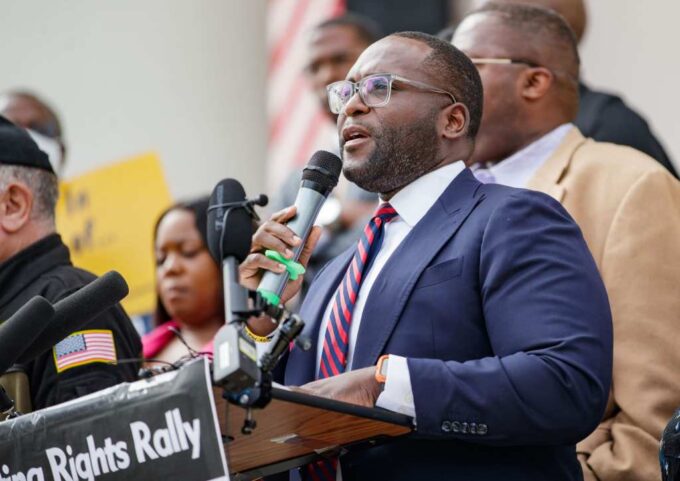DeSantis still seen as ‘danger’ to Black people and democracy after ending 2024 campaign
After Florida Governor Ron DeSantis announced the end of his 2024 presidential campaign on Sunday, Black Floridians are slamming the state’s chief executive, who they say built his White House run on punching down Black and other marginalized communities across the state through policy and legislation.
“Governor DeSantis used his climb to his presidential campaign on the backs of Blacks, on the backs of the LGBTQ community, on the backs of immigrants,” said Shevrin Jones, a Florida state senator representing the Broward and Miami-Dade areas.
“He tried to ride a discrimination, anti-Blackness wave that he thought would resonate in America.
“There’s no vindication for us as a people just because he’s not running for president anymore,” Jones told theGrio. “While he’s still in office, he’s still a danger, not just to Black people, but he’s a danger to democracy.”
Since entering the governor’s office in 2019, DeSantis has prioritized how race and Black history are taught in Florida public schools. In 2022, he signed into law the “Stop WOKE Act,” which restricts critical race theory, a catchall phrase for Republicans to describe how race is discussed in classrooms.
DeSantis targeted the graduate school-level curriculum and vowed to ban it from schools (despite not being taught in them) because it teaches children to “hate this country” and “hate each other.”
Most recently, DeSantis barred the state’s 28 public colleges from using state and federal funds for diversity, equity, and inclusion programs, activities, and policies. His administration also previously banned an advanced placement African-American history course for high school students and sanctioned a new curriculum teaching middle school students that enslaved Black people benefited from slavery because they developed needed skills.
“We knew what he was doing in Florida by creating the cultural wars that would not translate across the rest of this nation. The rest of this nation is not Florida,” said Jasmine Burney-Clark, founder of Equal Ground, a civic engagement organization based in Orlando. “But, sadly, Black folks are going to now have to suffer and live with the decisions that he made through policy agendas that will impact us for generations, not just an election.”
Senator Jones said he worries that DeSantis, backed by a Republican supermajority in the state legislature, will continue a policy crusade designed to divide Florida on race, LGBTQ rights, and immigration.
That could change, he said, “if each leader in each chamber realized that we do not have to take orders from someone who nearly tried to be a dictator passing policies and laws that totally infringed on the rights of human beings.”
Following DeSantis’ now-failed presidential campaign, Burney-Clark said she believes there’s an “opportunity” to reverse some of the damage he caused if Republican lawmakers previously beholden to him decide to “shift the narrative” by working on policies that are “meaningful.”
“This governor no longer holds power over them in the ways that they perceived he would, had he become president of the United States,” she argued. “I don’t know what he gains from continuing to be an authoritarian leader in this state by pushing that agenda.”
DeSantis could also become a surrogate for former President Donald Trump, the leading candidate in the Republican presidential primary. The Florida governor immediately endorsed his former opponent over the other remaining candidate, former United Nations ambassador and South Carolina governor Nikki Haley.
Senator Jones said it was interesting that DeSantis, who previously slammed Trump for not being loyal to anyone “who hasn’t kissed the ring,” has now endorsed the former president.
“Now DeSantis has kissed the ring again,” he said.
Jones, who is also a member of the Biden-Harris campaign’s national advisory board, said Trump is a threat to democracy and the country and that even Republicans know it.
“We’re talking about a man who tried to steal an election,” he said.
The Biden-Harris administration has many accomplishments under its belt, particularly as it relates to improving the economic conditions for Black Americans, Jones argued.

“When it comes to African-Americans, we’re seeing the highest when it comes to Black businesses. We’re seeing record numbers of individuals who are now able to get insulin,” he said. “Even in spite of the ruling from the Supreme Court when it comes to forgiving student loans, the president found and continues to find a way to bring economic relief to people’s pockets.”
However, winning the Biden-Harris ticket in Florida remains an uphill battle. Though former President Barack Obama won the state in the 2008 and 2012 elections, Burney-Clark noted that the state’s campaign infrastructure with a more diverse electorate has been “obliterated” and “disinvested.”
“We got really close, however, under Andrew Gillum,” she said, referring to the former Tallahassee mayor and Democratic nominee who lost a close gubernatorial race against DeSantis in 2018.
“There were some remnants of that coalition still in place, but without serious and maintained infrastructure year-round in the state of Florida, we are going to see, I think, that type of victory this year,” said Burney-Clark, who noted that DeSantis massively expanded his winning margins in his 2022 reelection race.
“Florida could be on a path to redemption by utilizing the Biden-Harris campaign to get clear about what the issues are, get clear about the messaging, and use other sorts of benchmarks to determine what success could look like for future races,” she said.
Despite winning against Gillum in 2018, DeSantis was able to expand his margin of victory in 2022 to more than 1.5 million votes, which suggests a difficult path for President Biden and other Democrats on the ballot in Florida this November.
“We’ve got to measure our work and our victory differently this year to determine if you’re on the right path to helping Florida win some races that include more progressive leaders in this state,” said Burney-Clark.
Recommended Stories

Gerren Keith Gaynor is a White House Correspondent and the Managing Editor of Politics at theGrio. He is based in Washington, D.C.
Never miss a beat: Get our daily stories straight to your inbox with theGrio’s newsletter.
Source link
Black Floridians are criticizing Governor Ron DeSantis for using his presidential campaign to target marginalized communities with discriminatory policies and legislation. DeSantis has restricted the teaching of race and Black history in schools, banned diversity programs at public colleges, and promoted a curriculum that downplays the impact of slavery on Black people. Critics fear that he will continue to divide the state on issues of race, LGBTQ rights, and immigration. While some see his decision to end his presidential campaign as an opportunity to reverse the damage he has caused, others worry that he may become a surrogate for former President Donald Trump. Despite DeSantis’ victory in the 2022 gubernatorial race, there are concerns about the impact of the Biden-Harris administration’s economic policies in Florida and the need for a more diverse campaign infrastructure. The future success of progressive leaders in the state will depend on a clear understanding of the issues and effective messaging.





